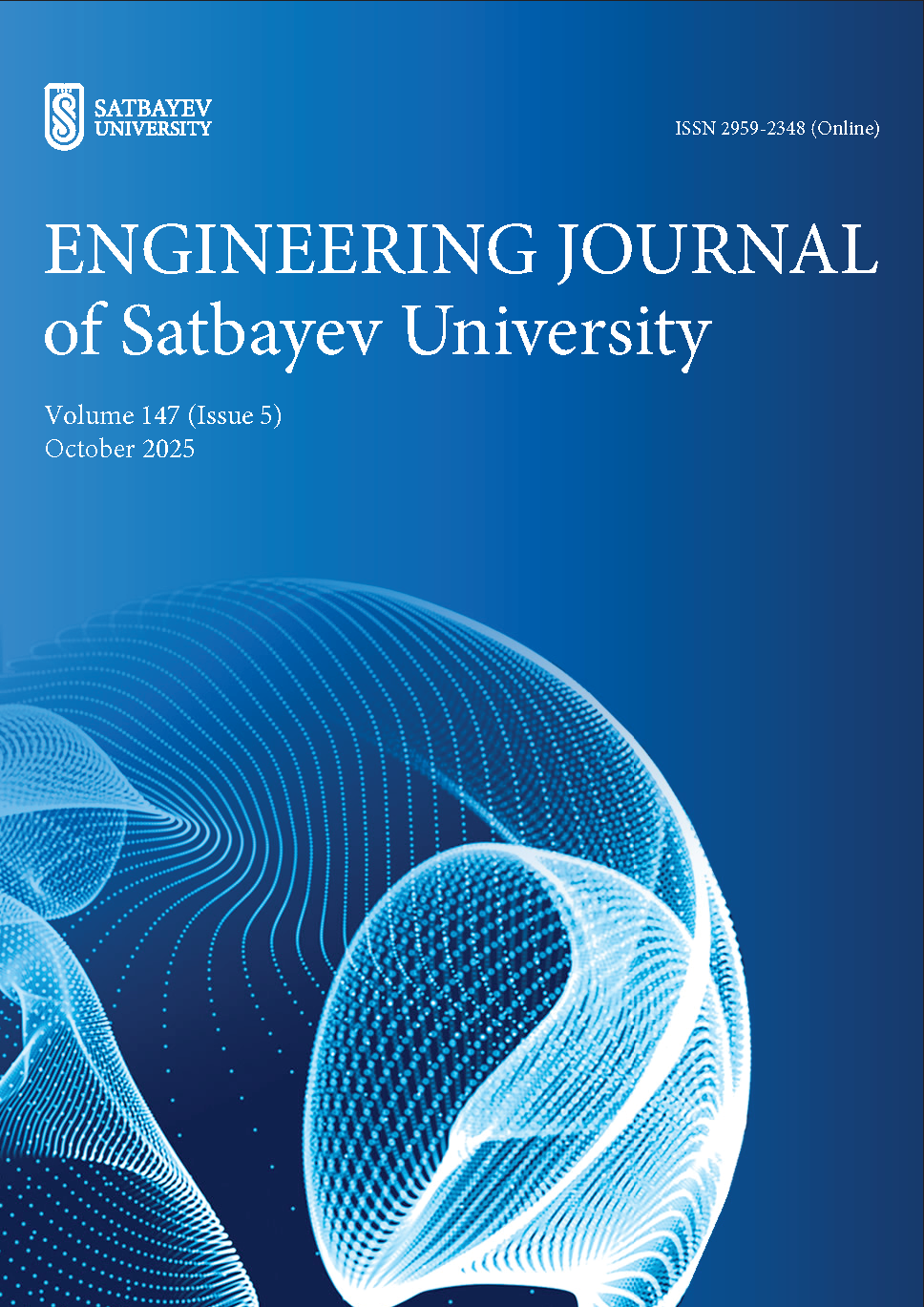Study of the acoustic properties of new smelted steels alloyed with chromium, vanadium, and manganese
DOI:
https://doi.org/10.51301/ejsu.2025.i5.02Keywords:
impact noise, damping properties, acoustic properties, vanadium alloying, low-alloy steels, noise reductionAbstract
The article presents the results of a comprehensive study of the acoustic, damping, and vibration properties of newly cast steels alloyed with vanadium, chromium, and manganese. The relevance of the work is determined by the growing industrial need to reduce impact noise and vibration generated during the operation of machinery, mining, and metallurgical equipment. Increased acoustic loads lead to accelerated wear of components, reduced reliability of units, and adverse effects on workers, which makes the search for new materials particularly important. The study includes an analysis of literature data on existing noise-reduction methods and demonstrates the advantages of using alloys with enhanced internal damping compared to traditional structural materials. The experimental part was carried out by modeling impact processes using specialized measuring equipment that made it possible to record sound pressure levels, frequency spectra, and vibration decay rates. Special attention was paid to the influence of chemical composition, phase structure, and grain morphology on the acoustic characteristics of the steels. It was established that the optimal combination of alloying elements promotes the formation of a structure that provides more efficient vibration attenuation. The results obtained can be used in the development of new materials and protective components aimed at reducing industrial noise and increasing equipment durability.
References
Zhang, L., Jiang, X., Sun, H., Zhang, Y., Fang, Y. & Shu, R. (2023). Microstructure, Mechanical Properties and Damping Capacity of Fe-Mn-Co Alloys Reinforced with Graphene. Journal of Alloys and Compounds, (931), 167547. https://doi.org/10.1016/j.jallcom.2022.167547
Cai, L. Q., Li, Y., He, W., & Peng, H. B. (2021). Researches and progress in damping alloys. Metallic Functional Materi-als, 28(2), 15-28
Lee, Y.K., Baik, S.H., Kim, J.C. & Choi, C.S. (2003). Effects of Amount of ε Mar tensite, Carbon Content and Cold Work-ing on Damping Capacity of an Fe-17% Mn Martensitic Al-loy. Journal of Alloys and Compounds, (355), 10-16. https://doi.org/10.1016/S0925-8388(03)00244-5
Lee, Y.K., Jun, J.H. & Choi, C.S. (1997) Damping Capacity in Fe-Mn Binary Alloys. J. Transactions of the Iron &
Steel Institute of Japan, (37), 1023-1030. https://doi.org/10.2355/isijinternational.37.1023
Shin, S., Kwon, M., Cho, W., Suh, I.S., & De Cooman, B.C. (2017). The effect of grain size on the damping capacity of Fe-17 wt%Mn. Materials Science and Engineering: A, (683), 187-194. https://doi.org/10.1016/j.msea.2016.10.079
International standart ISO 15510. (2015). Stainless Steel. Chemical Composition: Handbook, 2nd edition. Geneva: In-ternational Organization for Standardization
Granato, A.V. & Lucke, K. (2004) Theory of Mechanical Damping Due to Dislocations. Journal of Applied Physics, (27), 583-593. https://doi.org/10.1063/1.1722436
Watkinson, M. & Clarke, R. (2018). Scott-Brown’s Otorhino-laryngology and Head and Neck Surgery. CRC Press
Flint, P.W. (2015). Cummings Otolaryngology: Head and Neck Surgery. 6th ed. Elsevier, Philadelphia
Katz, J., Chasin, M., English, K., Hood, L. & Tillery, K. (2015). Handbook of Clinical Audiology. Wolters Kluwer, Philadelphia
Roeser, R.J., Valente, M. & Dunn, H. (eds.). (2021). Clinical Audiology: An Introduction. 3rd ed. Thieme Medical Pub-lishers, New York
Teixeira, C.S. (2021). Occupational noise exposure and hearing loss: A systematic review. Frontiers in Public Health, (9), 644631. https://doi.org/10.3389/fpubh.2021.644631
Utepov, E.B., Tjazhin, Zh.T., Utepova, A.B., & Kozhahan, A.K. (2002). Issledovanie harakteristik vibracii trubchatogo obrazca pri soudarenii. Trudy Mezhdunarodnoj nauchno-prakticheskoj konferencii «Estestvenno-gumanitarnye nauki i ih rol' v podgotovke inzhenernyh kadrov», Almaty: KazNTU im. K.I. Satpaeva.
Chen, X., Wang, Y. & Zhang, J. (2023). Recent progress
in vibration and noise control in industrial machinery. Jour-nal of Sound and Vibration, (551), 117493. https://doi.org/10.1016/j.jsv.2023.117493
Teixeira, C.S., Rodrigues, C.E. & Silva, J.A. (2024). Occupa-tional noise exposure and hearing protection in the manufac-turing sector: A systematic review (2010-2022). Internation-al Journal of Industrial Ergonomics, (94), 103485
Wu, B., Chen, Y. & Liu, H. (2023). Development of high-damping metallic materials for vibration reduction: A review. Materials Science and Engineering A, (856), 144090
ISO 15510:2014. Stainless steels – Chemical composition. 2nd edition. Geneva: International Organization for Stand-ardization
Shafiei, E. & Lee, J.H. (2025). Advances in damping materi-als and applications in mechanical engineering structures. Materials Today: Proceedings, (73), 301-312
Li, M. & Gao, Z. (2023). Smart materials for adaptive noise and vibration control systems: A review. Mechanical Sys-tems and Signal Processing, (198), 110413
Downloads
Published
How to Cite
Issue
Section
License
Copyright (c) 2025 Engineering Journal of Satbayev University

This work is licensed under a Creative Commons Attribution-NonCommercial-NoDerivatives 4.0 International License.
<div class="pkpfooter-son">
<a rel="license" href="http://creativecommons.org/licenses/by-nc/4.0/"><img alt="Creative Commons License" style="border-width:0" src="https://i.creativecommons.org/l/by-nc/4.0/80x15.png"></a><br>This work is licensed under a <a rel="license" href="http://creativecommons.org/licenses/by-nc/4.0/">Creative Commons Attribution-NonCommercial 4.0 International License</a>.
</div>





